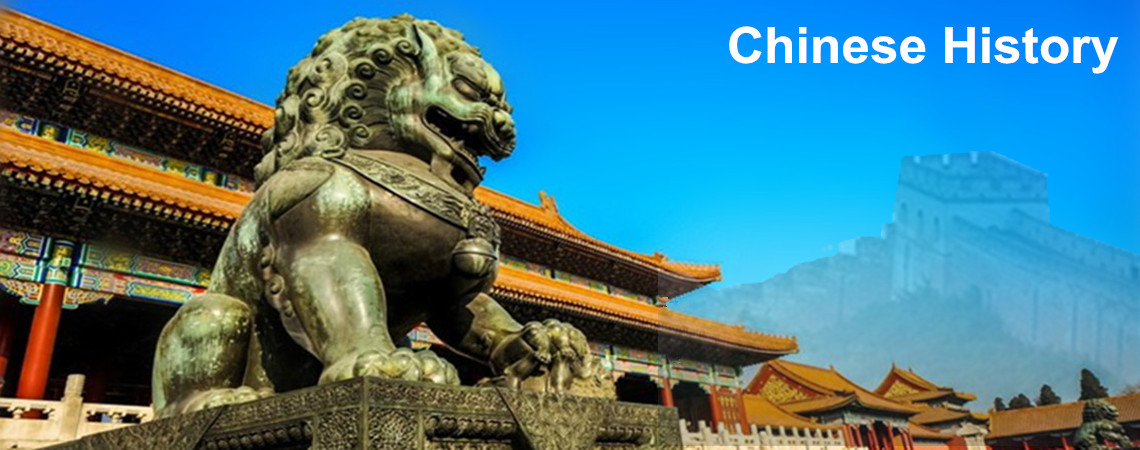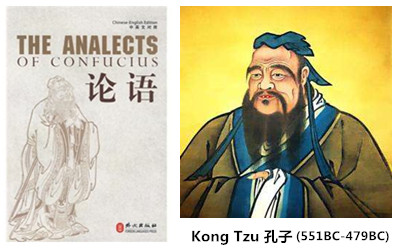
Kung Tzu: The Analects
 The Analects , (《论语》Lun Yu) was wriiten by Kung Tzu or Confucius ( 551 BC- 479 BC) as his primarily features teachings attributed.
The Analects , (《论语》Lun Yu) was wriiten by Kung Tzu or Confucius ( 551 BC- 479 BC) as his primarily features teachings attributed.
The Analects—arguably the most widely read and influential literary work in human history—is an Ancient Chinese text that contains selected sayings and conversations of various people,
According to most traditional accounts, Confucius never wrote down his teachings. They were passed down verbally and later put in writing, and not necessarily in a very systematic way. The Analects is widely regarded as the most dependable record of his various sayings and conversations. However, it seems to have different parts that are from different sources, many out of place or seemingly irrelevant passages, and a frequent lack of internal consistency.
Most evidence supports the Analects as being a very early text. For one thing, the language, terminology, and concepts used are consistent with material that predates content from similar texts dating around the 300s BC to 100s BC. Plus, the Analects portrays Confucius as a simple and understandable human being who never held major office and even had some shameful moments, whereas most later texts make him out to be a superhuman Sage who at one time held high position.
The very history of the Analects is for the most part entirely unknown. By the 100s BC, there were three versions of the text, and around the 1st century AD, a scholar named Chang Yu used two of them to make a new version that became the standard, and caused the others to disappear. Most of our early texts are from around the 100s and 200s AD, and are nearly identical to the one currently used.
The general view is that books 4 through 7 of the Analects are oldest and have the most authentic material, books 8 and 9 are next, books 1 through 3 and 11 through 15 are next, books 16 and 17 are next, book 18 is next, book 19 is a somewhat later book that contains mainly sayings and conversations of a few of Confucius’s disciples, and books 10 and 20 really seem out of place.
The Analects - Chapter 01
The Master "Is it not pleasant to learn with a constant perseverance and application?"
The Analects - Chapter 02
The Master said, "He who exercises government by means of his virtue may be compared to the north polar star, which keeps its place and all the stars turn towards it."
The Analects - Chapter 03
Confucius said of the head of the Chi family, who had eight rows of pantomimes in his area, "If he can bear to do this, what may he not bear to do?" The three families used the Yungode, while the vessels were being removed, at the conclusion of the sacrifice. The Master said, "'Assisting are the princes;-the son of heaven looks profound and grave';-what application can these words have in the hall of the three families?"
The Analects - Chapter 04
The Master said, "It is virtuous manners which constitute the excellence of a neighborhood. If a man in selecting a residence do not fix on one where such prevail, how can he be wise?"
The Analects - Chapter 05
The Master said of Kung-ye Ch'ang that he might be wived; although he was put in bonds, he had not been guilty of any crime. Accordingly, he gave him his own daughter to wife. of Nan Yung he said that if the country were well governed he would not be out of office, and if it were in governed, he would escape punishment and disgrace. He gave him the daughter of his own elder brother to wife.
The Analects - Chapter 06
The Master said, "There is Yung!- He might occupy the place of a prince."
The Analects - Chapter 07
The Master said, "A transmitter and not a maker, believing in and loving the ancients, I venture to compare myself with our old P'ang."
The Analects - Chapter 08
The Master said, "T'ai-po may be said to have reached the highest point of virtuous action. Thrice he declined the kingdom, and the people in ignorance of his motives could not express their approbation of his conduct."
The Analects - Chapter 09
The subjects of which the Master seldom spoke were-profitableness, and also the appointments of Heaven, and perfect virtue.
The Analects - Chapter 10
Confucius, in his village, looked simple and sincere, and as if he were not able to speak.
The Analects - Chapter 11
The Master said, "The men of former times in the matters of ceremonies and music were rustics, it is said, while the men of these latter times, in ceremonies and music, are accomplished gentlemen.
The Analects - Chapter 12
Yen Yuan asked about perfect virtue. The Master said, "To subdue one's self and return to propriety, is perfect virtue. If a man can for one day subdue himself and return to propriety, an under heaven will ascribe perfect virtue to him. Is the practice of perfect virtue from a man himself, or is it from others?"
The Analects - Chapter 13
Tsze-lu asked about government. The Master said, "Go before the people with your example, and be laborious in their affairs."
The Analects - Chapter 14
Hsien asked what was shameful. The Master said, "When good government prevails in a state, to be thinking only of salary; and, when bad government prevails, to be thinking, in the same way, only of salary;-this is shameful."
The Analects - Chapter 15
The Duke Ling of Wei asked Confucius about tactics. Confucius replied, "I have heard all about sacrificial vessels, but I have not learned military matters." On this, he took his departure the next day.
The Analects - Chapter 16
The head of the Chi family was going to attack Chwan-yu. Zan Yu and Chi-lu had an interview with Confucius, and said, "Our chief, Chil is going to commence operations against Chwan-yu."
The Analects - Chapter 17
Yang Ho wished to see Confucius, but Confucius would not go to see him. On this, he sent a present of a pig to Confucius, who, having chosen a time when Ho was not at home went to pay his respects for the gift. He met him, however, on the way.
The Analects - Chapter 18
The Viscount of Wei withdrew from the court. The Viscount of Chi became a slave to Chau. Pi-kan remonstrated with him and died.
The Analects - Chapter 19
Tsze-chang said, "The scholar, trained for public duty, seeing threatening danger, is prepared to sacrifice his life. When the opportunity of gain is presented to him, he thinks of righteousness. In sacrificing, his thoughts are reverential. In mourning, his thoughts are about the grief which he should feel. Such a man commands our approbation indeed.
The Analects - Chapter 20
Yao said, "Oh! you, Shun, the Heaven-determined order of succession now rests in your person. Sincerely hold fast the due Mean. If there shall be distress and want within the four seas, the Heavenly revenue will come to a perpetual end."
The Thirty Six Stratagems
The perception of perfect preparation leads to relapsed vigilance. The sight of common occurrences leads to slackened suspicion. Therefore secret machinations are better concealed in the open than in the dark, and extreme public exposure often contains extreme secrecy.







 Ask Questions ?
Ask Questions ?